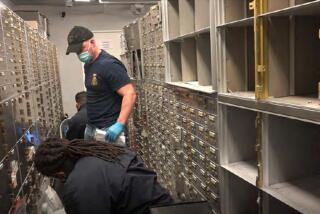Ruling in Ventura Case Sets Search-and-Seizure Precedent
- Share via
In a precedent-setting decision on search and seizure, an appellate court has ruled in a Ventura case that law enforcement officials do not need evidence of wrongdoing before searching the residence of an individual on probation.
In reversing a Ventura County judge’s decision, the 2nd District Court of Appeal declared that the search of a juvenile’s bedroom was not unconstitutional because the youth had consented to it as part of the terms of his probation.
The search and subsequent seizure from the bedroom of a variety of weapons had “a legitimate law enforcement purpose,” wrote Associate Justice Kenneth Yegan on Wednesday in a unanimous 3-0 opinion.
The case focused on a 14-year-old member of the Ventura Avenue Gangsters, who pleaded guilty to petty theft in October, 1990.
The following month, he was placed on probation, which included among its terms consent for law enforcement officials to search his residence at any time during the probation period.
In December, 1990, three Ventura police officers went to the apartment where the gang member lived with his parents and asked to search his bedroom, court papers said. Finding that the youth was at school and that the bedroom door was locked, the officers summoned firefighters, who broke the door down.
Police found handguns, a sawed-off rifle, ammunition, knives, a martial arts weapon, marijuana and beer in the juvenile’s bedroom, according to the appellate opinion.
The youth was rearrested, and the county prosecutor charged that the juvenile had broken the rules of his probation, which prohibited him from having such items in his possession.
But Superior Court Judge Robert C. Bradley found the search illegal under the Constitution’s 4th Amendment, which protects individuals against “unreasonable searches and seizures. . . .”
Bradley ruled that such searches, even when consented to by someone on probation, were arbitrary under a California Supreme Court decision.
On Wednesday, the appellate court overruled the Ventura judge.
“Being on probation with ‘a consent search term’ is akin to sitting under the Sword of Damocles,” the appellate opinion said.
Ventura County Deputy Dist. Atty. Michael D. Schwartz, who prosecuted the juvenile, said the decision is important because it explains the state Supreme Court decision.
“You give something up when you’re on probation,” Schwartz said. “It’s not like ordinary citizens who wouldn’t be subject to searches like this.”
In the 1987 state Supreme Court decision, the justices sought to establish ground rules for police searches of individuals on probation who had given permission for such searches as a condition of probation.
Often, after conviction, an individual agrees to what is called a “consent search term”--allowing police to search a convicted individual’s residence at any time during the probation period.
The state Supreme Court case sought to establish the parameters of such a search.
“This case makes it clear that police may search a probationer’s residence without suspicion of a violation of the law as long as its purpose is to ensure that the individual is complying with the law,” Schwartz said.
The juvenile’s lawyer, Jonathan B. Steiner of Los Angeles, executive director of the California Appellate Project, could not be reached for comment. The organization, similar to a public defender’s office, handles cases on appeal without charge to the defendant.
Authorities did not release the name of the defendant because he is a juvenile.
More to Read
Sign up for Essential California
The most important California stories and recommendations in your inbox every morning.
You may occasionally receive promotional content from the Los Angeles Times.













